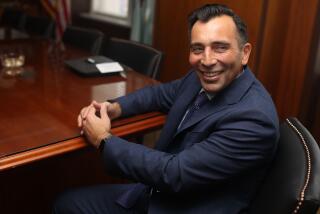Loyalty to Bush, Cheney shaped policy and advice
washington -- As Alberto R. Gonzales closes the door on his Washington career, he leaves an enduring legacy: a Justice Department mired in controversy over the firing of U.S. attorneys and a series of legal and moral challenges to his post-Sept. 11 policies on presidential power, torture and domestic spying.
“This resignation is not the end of the story,” Senate Majority Leader Harry Reid (D-Nev.) said Monday in a statement that indicated Democrats’ intent to continue probing Gonzales’ tenure. “Congress must get to the bottom of this mess and follow the facts where they lead, into the White House.”
The controversies lingering beyond Gonzales’ scheduled departure next month fall into two broad categories: whether he went too far in abridging civil liberties in the name of safeguarding the nation against terrorist threats, and whether he and his subordinates allowed political considerations to intrude improperly on the administration of justice.
During his service as White House counsel from 2001 to 2005, Gonzales wrote a memo saying that anti-torture laws and the Geneva Convention could be waived for some prisoners. He approved or oversaw the drafting of rules for military tribunals that limited the rights of detainees, and he pushed for expanded government power to engage in domestic spying. Then came the firing of nine U.S. attorneys in 2006.
Gonzales’ actions reflected his loyalty to George W. Bush and Vice President Dick Cheney but drew heated criticism from others -- including Congress and, in the case of military tribunals, the Supreme Court.
History will render final judgment on the controversies in Gonzales’ wake, but even some Republicans agree that the Justice Department’s morale and credibility have been damaged as it faces mounting challenges.
Defense lawyers around the country are contesting indictments based on alleged politicization of the department. The administration’s treatment of detainees in its war on terrorism is under attack in federal courts. And several senior department officials have left or have announced their intention to depart, including the chief of the civil rights division, whose record also has drawn fire from Democrats.
A Gonzales defender, Viet D. Dinh -- who served as assistant attorney general from 2001 to 2003 and was the architect of the Patriot Act -- said Monday that Gonzales’ accomplishments were obscured by a personal style that often clashed with Capitol Hill.
“It’s ironic. But you look back at his record, he’s actually done a pretty damn good job,” said Dinh, who credited Gonzales with establishing the department’s national security division, creating the Project Child Safe anti-exploitation initiative and pioneering new techniques for prosecuting terrorism suspects.
“All of these show very strong leadership and substantive achievements,” Dinh said. “The problem is that his inability to cut through the political process really shortchanged the department’s accomplishments and made him unable to do his job.”
Of all the battles that swirled around Gonzales, the most far-reaching may prove to be his role in asserting broad new claims of executive power in connection with the war on terrorism.
He approved or supported White House policies on the secret detention of terrorism suspects; the practice of “extraordinary rendition,” under which prisoners were transferred to countries known to engage in torture; and the use of the military system to hold detainees indefinitely without access to due process under U.S. law.
Gonzales signed off on CIA interrogation techniques such as “water-boarding” -- a technique in which a prisoner is strapped to a board and doused with water to simulate the sensation of drowning -- that the United States long had considered torture.
His department refused to rule out the use of controversial methods that included subjecting prisoners to temperature extremes and sleep deprivation.
The administration defended these and other related policies on the grounds that, as “enemy combatants,” detainees were not subject to the rules governing prisoners of war or persons held in the regular criminal justice system.
In a Jan. 25, 2002, memorandum to Bush, as White House counsel, Gonzales said the “new paradigm” of the war on terrorism renders obsolete the Geneva Convention’s “strict limitations on questioning of enemy prisoners, and renders quaint some of its provisions.”
That memo drew strong and immediate objections from then-Secretary of State Colin L. Powell, who said it would “reverse over a century of U.S. policy and practice.” But Gonzales’ view became administration policy.
Gonzales also opposed efforts by other Bush administration officials to close the U.S. military’s detention center for suspected terrorists at Guantanamo Bay, Cuba.
In the area of domestic spying, Gonzales and his Justice Department subordinates approved secret eavesdropping and other forms of spying by the National Security Agency, FBI and Treasury Department that skirted some traditional checks and balances.
“The central legal and policy issue facing us today is, When . . . should the government be allowed to conduct large numbers of national security wiretaps for long periods of time without prior findings of probable cause by judges?” said David Kris, a former senior Justice Department lawyer in the Bush and Clinton administrations who recently co-wrote “National Security Investigations and Prosecutions,” a book on surveillance law.
The department and the Bush administration have suffered serious legal setbacks, including two Supreme Court rulings rejecting their policies at Guantanamo Bay.
Many of the arguments about Gonzales-led policies are just now coming to a head in courtrooms, in the halls of Congress and on the pages of law journals. They are not likely to be resolved soon.
Gonzales’ efforts to push the boundaries on behalf of administration security priorities were captured memorably in the Senate testimony of former Deputy Atty. Gen. James B. Comey, who described how Gonzales approached then-Atty. Gen. John Ashcroft in the hospital a day after Ashcroft had gallbladder surgery in March 2004. Comey was acting as attorney general while Ashcroft recuperated.
According to Comey, Gonzales lobbied the seriously ill Ashcroft to reauthorize a domestic wiretap program that granted the government broad authority to monitor the electronic communications of people in the United States.
The effort failed when Comey raced to Ashcroft’s bedside, at the urging of Ashcroft’s wife. Ashcroft told Gonzales that Comey was in charge. Gonzales denied pressuring Ashcroft.
Although Ashcroft and Comey refused to support the program, it was certified anyway, prompting both of them to threaten to resign, along with FBI Director Robert S. Mueller III and other officials. Bush agreed to restructure the program.
Gonzales was criticized for providing evasive testimony to Congress about that incident, and about the surveillance program in general.
Comey, during his testimony, offered praise for most of the nine U.S. attorneys the department had fired under Gonzales.
As lawmakers investigated the firings and Gonzales’ role, the attorney general lost support from nearly all congressional Democrats and an increasing number of Republicans.
In June, 53 members of the Senate voted for an expression of “no confidence” in the attorney general.
Seven Republicans joined Democrats in supporting the nonbinding resolution, which never came to a final vote.
Two of the prosecutors have said they believe they may have been terminated because they did not investigate allegations that would have been helpful to GOP electoral goals.
Speaking to reporters Monday about Gonzales’ resignation, Bush said it was sad that the attorney general had had his “good name dragged through the mud for political purposes” during the hearings on his tenure.
Democrats had led the charge against Gonzales and rushed to the cameras to herald his resignation.
But numerous Republicans had called for him to leave as well, including Sens. John E. Sununu of New Hampshire and Norm Coleman of Minnesota, both of whom are to run for reelection next year.
Republican Sen. Arlen Specter of Pennsylvania, ranking member of the Judiciary Committee, had harshly questioned Gonzales’ judgment and described his continued presence at the Justice Department as “very, very damaging.”
Specter told reporters Monday that he would not criticize the attorney general.
But he added that he hoped the department would “regain functionality.”
--
tom.hamburger@latimes.com
More to Read
Get the L.A. Times Politics newsletter
Deeply reported insights into legislation, politics and policy from Sacramento, Washington and beyond. In your inbox three times per week.
You may occasionally receive promotional content from the Los Angeles Times.






